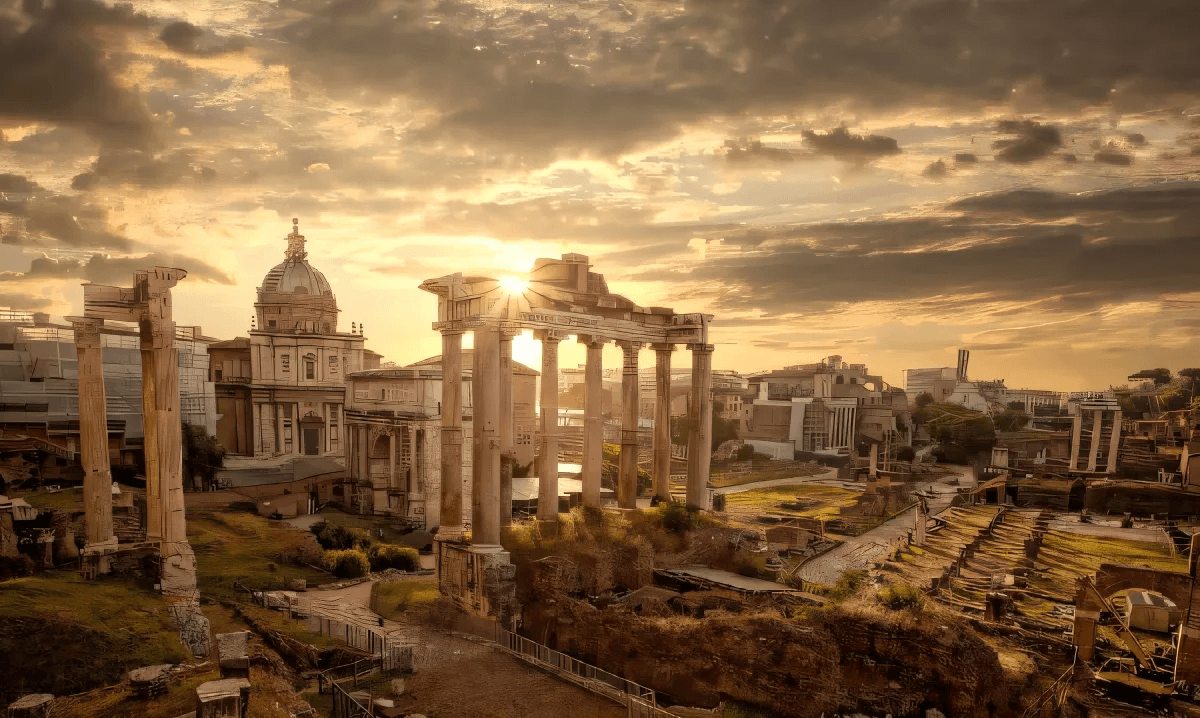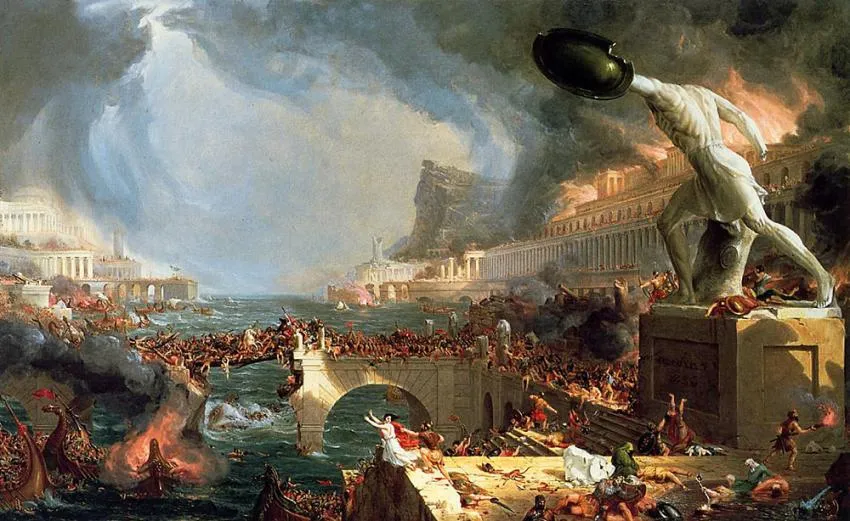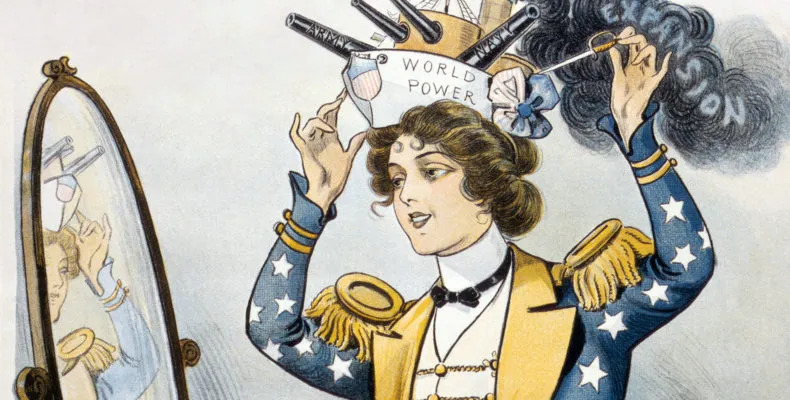3 Comparisons Of The Fall Of Rome To The American Government
America and Rome. Historians have drawn comparisons between the two since the birth of America. Thousands of years span between these two civilizations, with America using not only Roman laws as part of the formation but also its vocabulary in defining those laws.

The History Channel recounts some of the reasons behind Rome's fall, and it seems that there are more similarities than differences in America today.
1. The Invasions by Barbarian Tribes
The Romans were dominant throughout the ancient world for hundreds of years. Even while still republic the dominance over the existing world was just a precursor of what was to come. But as time went on, and the empire expanded, forces outside the empire began to put pressure on their borders.
Over time, groups like the Vandals and the Goths would penetrate Rome's borders; eventually sacking the city by 410 A.D. Rome would go on to be sacked another time before it would be defeated in 476 A.D. when Germanic tribes dethroned Emperor Romulus Augustulus. Rome would never again have anyone in the position of Emperor, leaving only the Eastern half of the Empire to continue as the dominant force.
But what about America?
It's apparent that American is not being 'invaded' in the way that took out the western half of the Roman Empire. However, there have been setbacks in military success over the years.
Going back to peace established at the 38th parallel in Korea, and the evacuation of Vietnam in the 1970s all could be viewed as situational losses in the fight against communism during the cold war.
The rise in terrorism between the 1980s-2010s including 9/11, on top of the rise in domestic terrorism have all hindered the success of the military. Especially terrorism in that there isn't a particular country to fight. The War on Terror is essentially Guerilla warfare.

2. Economic Troubles and the Over-reliance on Slavery
Rome's economy was strong for hundreds of years; that is until the empire began to expand and took in labor in the form of slaves. The more the empire conquered, the more slaves were brought into the fold. Before slavery, Roman legions on leave would return and lease land, cultivate and manage during peacetime. These veterans would raise families and add to the economy with the crops they would grow, contributing to the overall economy of the country.
But with time and with more conquests, the legions were on deployment longer than before; while back in Rome the new slaves would be purchased by wealthy landowners who found it cheaper to use slaves on their lands than the veterans.
When those legions returned on leave, finding work for themselves and support for their families were scant at best. Now that slaves have taken the main job of the returned legions, this made a vacuum in the job market. More and more there would be individuals who could not find work because of the slave market eliminating the need.
This effect on the economy also created a large wealth gap between the rich and the poor. The imbalance between the two only expanded, eventually exploiting the 'haves and the have nots.'
Like any country in the business of conquest, funds are needed to keep up the war effort. Rome was no different and would tax their citizens in the name of the expansions. Even with the increased taxes, the Empire was also overspending. The number of funds coming in was not enough for what was going out.
These kinds of issues within the economy contributed to the downward spiral that eventually befalls the Empire.
What about America?
Americans had slavery until 1865. While racial strife and government laws have severely hindered the success of all Americans, there is another area that is not looked at. The over-reliance on frontline workers.
Bus drivers, cashiers, administrative professionals, grocery store workers, fast food workers, etc., are all making minimal hourly pay. In cases where workers have families, the minimum pay isn't enough to support a family of four. Yet, its workers like these help keep the country running on a daily basis.
Covid has made it clear that in this current crisis how important it becomes in not having these kinds of workers can derail the American economy. Front line workers are more likely to contract the virus, making them unavailable to work, hindering the employer in the available workers to keep up with demand.
The domino effect that the virus has highlighted has brought into focus the differences in cost of living situations, and the wealth gap becoming more and more the focus in gathering help for these workers.

3. Rise of the Powers in the Eastern Half of the World
It's been established that the Empire became too huge to effectively manage by one person in the later centuries. So when the Empire was split into two, the idea was based on the ability to have better control over parts of the empire. In theory, it made sense from a military perspective.
However, it would do more harm than good. With the country split, dominance and weakness began to appear within the Empire. It was apparent that the Eastern half of the Empire was able to establish fortifications and defenses better than the Western half.
In the West, the existing fortifications were out of date; and left the capital more at risk. Also, the rise in outside forces in both East in West would be handled in different ways. The West has to deal with years of Germanic, and Gaelic tribes, which become too much leading to its eventual downfall.
The East's biggest outside force was the rise of the Ottoman Empire. Constantinople would be attacked by the Ottomans numerous times over the years. Each time the Empire being able to sustain the attacks with its natural border of protection by the surrounding seas.
They would be able to hold off the Ottomans for years until the fall of Constantinople in 1453. Mehmed II would take the city and establish a new capital for the Ottomans. Ottoman dominance would continue until the end of the first World War.
America's Dominance
America's dominance is throughout the world, not just in one section of the globe. But that dominance is and has been changing throughout these last several years. If anything, under the Trump administration the country has become more isolationist than before.
The last time this level of isolationism was seen was in the years prior to the first World War. That feeling of being apart of the world table has decreased tremendously, yet the feeling of American dominance and toughness has never been higher.
Trump ran on keeping America protected, with walls and protections in the house. But in doing so, the structure of American politics declined as a result.
What could be next for America is only determined by the actions and lessons learned from history. Whether or not those lessons are learned from the Romans, or through their own hard ways is too soon to tell.
One thing is for sure, the links between Rome and America are uncanny. In order to learn how best to approach the future is to address the past.
Opinions and Perspectives
The economic parallels are striking but we have better solutions available now.
The comparison between Roman civic decay and our political division is particularly relevant today.
These historical parallels are fascinating but we shouldn't assume the same outcome.
The parallel between Rome's decline and our current situation seems overblown to me.
This analysis really puts our current challenges in historical context.
The comparison between Roman taxation issues and our current deficit spending is enlightening.
The parallel between Roman military overextension and our global commitments is spot on.
The comparison between Roman border issues and modern immigration challenges is particularly relevant.
The economic parallels are concerning, but we have more sophisticated financial tools now.
Interesting how both empires faced challenges with integrating diverse populations.
The frontline worker comparison really struck a chord with me after the pandemic.
I see the similarities but also think we have better tools to address these challenges today.
The article makes solid points about economic inequality, but I think our democracy is stronger than Rome's ever was.
Fascinating how both empires struggled with similar economic and social issues.
This really puts our current political divisions in historical perspective.
The article's points about military challenges ring true, especially regarding unconventional warfare.
The parallel between Rome's slave economy and our reliance on underpaid workers is uncomfortable but accurate.
Reading this makes me think we need to seriously address wealth inequality before it's too late.
I'm struck by how both empires struggled with balancing military spending and domestic needs.
The section about the Eastern Empire's rise really puts China's growing influence in perspective.
This analysis seems too focused on negative comparisons. America has shown incredible resilience in facing challenges.
The article overlooks how technology and global connectivity make our situation unique.
I work in economics and can confirm many of these patterns are worryingly similar to what we're seeing today.
The comparison between Roman veteran unemployment and our modern job market is particularly thought-provoking.
As a history buff, I appreciate how this article draws parallels without oversimplifying complex historical events.
The article's comparison of barbaric invasions to terrorism is quite insightful. Both are difficult to combat with traditional military tactics.
I actually think our situation is worse than Rome's in some ways. At least they didn't have to deal with climate change.
We're definitely seeing similar patterns with wealth concentration and economic inequality.
The tax system comparison is particularly relevant. Rome couldn't balance its books either.
Anyone else notice how both empires struggled with managing vast territories? Makes you think about our federal vs state challenges.
I work in retail and totally relate to the frontline worker comparison. We keep everything running but get minimal recognition.
The article's point about military overextension really hits home when you think about our global military presence.
Let's not forget that Rome fell over centuries. These comparisons make it seem like we're on the brink of collapse, which I think is alarmist.
I find it concerning how accurately this article predicts potential problems in our future based on Rome's past.
The parallel between Roman border pressure and our modern immigration challenges is worth exploring further.
You guys are missing the point about the Eastern Empire comparison. China's rising influence is exactly what the article is highlighting.
The section about slavery's economic impact is fascinating. Never thought about how it created unemployment for Roman citizens.
Interesting article, but I think it misses how different our military situation is from Rome's. We're not facing physical invasion from neighboring tribes.
The wealth gap comparison is spot on. Just like Rome, we're seeing a dangerous divide between the ultra-wealthy and everyone else.
I disagree with the article's take on American isolationism. Our global influence through technology and culture is stronger than ever.
The point about frontline workers really resonates with me. We treat them like Rome treated their returning veterans, essential but undervalued.
While I see some similarities, I think comparing modern America to ancient Rome is oversimplified. Our global economy and technological advancement make this a completely different situation.
The parallels between Rome and modern America are striking. I never realized how similar our economic struggles are to what Rome faced.
